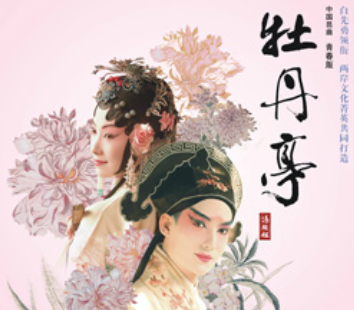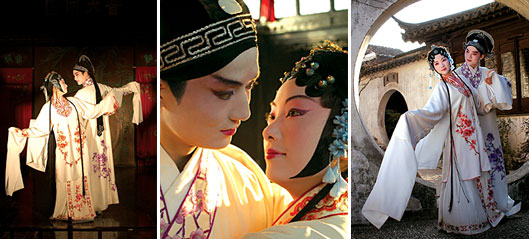Romeo and Juliet, arguably Shakespeare's best-known and most-performed play, has found its way back to Broadway after 36 years, albeit in a modern-day version that has Orlando Bloom as Romeo and Condola Rashad, a black actress, playing Juliet, but the revival of the tragedy about two young star-crossed lovers whose deaths ultimately reconcile their feuding families is making waves among critics.
Less known is The Peony Pavilion, an equally passionate play that bears remarkable similarities to the imagination of Shakespeare.

Penned by Tang Xianzu, a retired court official of the Ming Dynasty (1368-1644) who died the same year as Shakespeare (1616), his masterpiece has been translated into English and performed in the West several times.
Both authors relied on supernatural forces to advance their plots. The Flower Goddess, for instance, who brought the dream lovers together in The Peony Pavilion, is almost interchangeable with Puck in A Midsummer Night's Dream or with Ariel in The Tempest.
"Peony Pavilion is so much more than a love story," noted Xianzu specialist professor Andrea Goldman, who earned her doctorate at Berkeley and teaches Chinese history at the University of Los Angeles.
"It's also a scathing indictment of the limitations of the super-rationalist, but rather clueless, world of Neo-Confucian politics. In launching his critique of society, Xianzu, like many of his contemporaries, also borrowed freely from Buddhist and Daoist philosophical concepts. After all, Du Liniang's love is so strong that it has the power to last three lifetimes -- and karmic rebirth was a notion drawn from the Buddhist tradition."
Indeed, what you should know first and foremost about The Peony Pavilion, a 16th-century Chinese musical drama about love, death, and resurrection -- and arguably the most famous of all Kunqu Operas -- is that its poetry can kill. It has killed before.
Passion is its currency, and when expressed through kunqu -- a sophisticated theatrical art form that fuses poetry, dance, and refined woodwind ensemble, not to mention fabulous costumes and makeup -- and with a story line rivaling Romeo and Juliet -- its performances literally stopped a few hearts in the audience during the late Ming Dynasty.
Why that is so is not difficult to understand. The Peony Pavilion was written in an era when China was going through a rigid, repressive style of Neo-Confucianism known as daoxue. It emphasized proper outward displays of behavior and rituals.
Living by the book became the ruling orthodoxy. This dismayed playwright Xianzu, a retired court official.
Qing versus daoxue
Fascinated with the regenerative power of authentic, true emotions, the concept known in Chinese as qing -- translated variously as love, desire, and/or passion -- he wrote The Peony Pavilion as a direct challenge and criticism to daoxue.
In the drama, Du Liniang, the young daughter of a high official, meets a young scholar named Liu Mengmei in a dream.
In a scene that many scholars regard as the most erotic in all of Chinese poetry, the two have a tryst in a garden of peonies. Liniang awakens and pines for her phantasmal lover, then dies, leaving behind a self-portrait.
Liu discovers her painting, and falls in love with her. Then the Underworld judge, moved by her beauty and her undying love, returns her to the mortal world. She appears to Liu as a ghost, and they again consummate their love.

Liu digs her up, whereby her soul rejoins her body. They elope, and, after a number of trials -- the bulk of which involves trying to convince her father, who embodies daoxue rigidity, that she is not a demon, and that her lover is not a grave robber -- the emperor pardons all.
Further comparisons between Xianzu and Shakespeare are inevitable. Both became influential in their venerable years. Peony was as well known in China, and for that matter, East Asia, as "Romeo and Juliet" was in the West. But unlike Shakespeare, who wrote and produced plays for a living, Xianzu became a playwright as an avocation, after retiring from public office.
Though quite famous at the end, Shakespeare was not considered wealthy by London standards, whereas Xianzu had the wealth, status, and leisure to devote his time to dramatic creation.
"His retirement from public life was surely also a form of protest against the corruption and dangers of officialdom in the late Ming," according to Goldman.
The play, originally composed with 55 scenes that included more than 400 arias of poetry, as well as spoken dialogue, was produced in its entirety only a few times in the years right after it was written. Performing the unabridged version could take as long as a week, challenging audiences and the performers.
The Kenneth Pai production, touring the US in 2006, was a major success, though the play had been shortened to 27 scenes running for three evenings, three hours each night. It also was performed to a sold out crowd in Shanghai in 2004. The Met museum in 2012 organized a truncated seventy-minute version of the masterpiece developed and directed by composer Tan Dun.
But beyond its theatrical triumph is the endearing story of an enduring Peony Pavilion, which survived several periods of suppression, the latest being the "cultural revolution" (1966-76), when it was banned. Yet, just like Du Liniang, the play has the power of endurance and resurrection.
"Many kun singers were sent to rural areas," noted Pai. "They worked in hard labor, but when no one was around, they sang out their lines so they wouldn't forget. After ten years, those who survived reunited and brought the play back to life. Oh, it's a very moving story in itself."
Andrew Lam is an editor with New America Media and the author of three books, "Perfume Dreams: Reflections on the Vietnamese Diaspora," "East Eats West: Writing in Two Hemispheres," and his latest, "Birds of Paradise Lost," a collection of short stories about Vietnamese refugees struggling to rebuild their lives in the Bay Area. He first reported on the Peony Pavilion production at UC Berkeley in 2006
